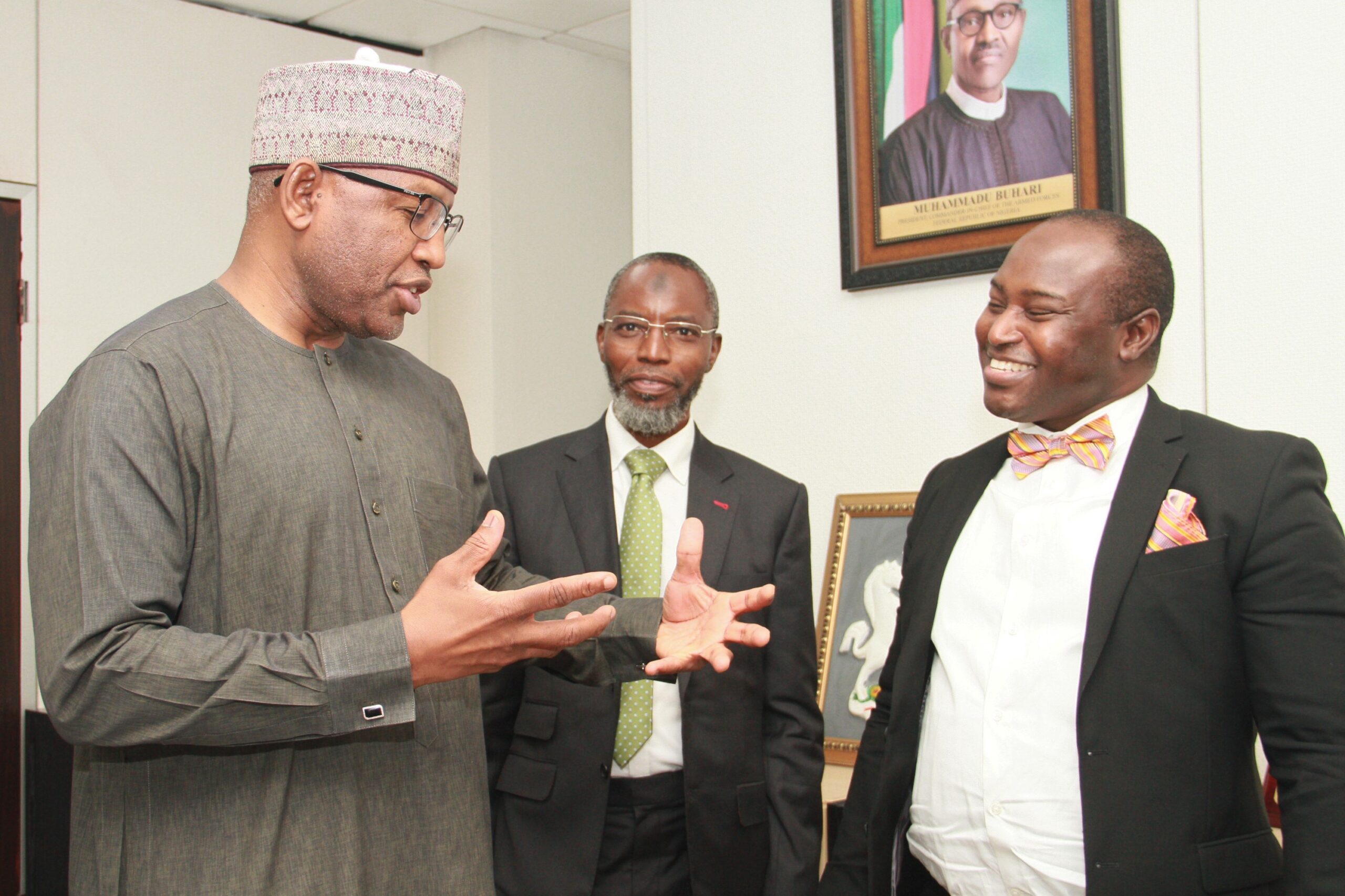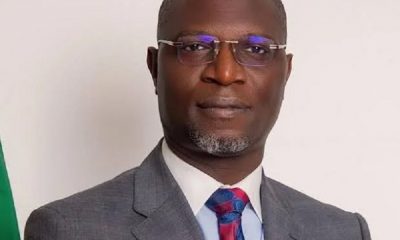Economy
SEC Targets Trillions of Naira from Non-Interest Capital Market

By Aduragbemi Omiyale
The Securities and Exchange Commission (SEC) has said it plans to enhance the non-interest capital market because of its capability to boost liquidity in the financial markets by trillions of Naira.
The Director-General of SEC, Mr Lamido Yuguda, while speaking with the executives of the Non-Interest Financial Institutions Association of Nigeria (NIFIAN) in Abuja over the weekend, said the market segment was given attention in the 10-year Capital Market Master Plan.
According to him, in the next three years, the plan is to ensure that 25 per cent of the total value of the Nigerian capital market is from the non-interest sector.
“We are talking of trillions, which means that we are not scratching the surface right now. Both the market and the commission need to do more. We are working on ensuring that we have a framework that looks at issues relating to the non-interest capital market and ensures we tackle them.
“There are many opportunities in the market right now for non-interest products. The biggest players right now are the pension fund. PenCom is interested that whatever product is there have some basic risk management features in them, but I think there is a lot that we can do.
“You talk about the Sukuk market and the move towards complexities, I would say that even the simple Sukuk, we have not had enough of it.
“When we came in 2020, it was only the sovereign Sukuk and the subnational Sukuk from Osun State. We have tried to attract interest to the product by doing many seminars and rejoining IFSB fully. We also tried to encourage private issuers and show the potential of the Sukuk to other players in the market. This is a simple product but a very powerful one,” he said.
Mr Yuguda stated that Nigeria needs to adopt the normal Sukuk forms where money is raised via Sukuk, assets are built and then cash flows are generated from the assets which then flow back to the Sukuk holders.
“That’s the traditional way, which happened in countries like Malaysia. Malaysia has a lot of hotels and resorts, and the key financing tool they have used is the Sukuk. They understand the power of this Sukuk instrument. It’s a collateralised form of lending; the asset is built and belongs to the people who have contributed money.
“You can see the cash flows coming back. These hotels are increasing in output in the economy in which it is located. People are working, earning more income. The investors are happy because they are receiving the cash flows, and the country is getting more prosperous as people from other parts of the world go there to have a good life,” the SEC chief stated.
The DG emphasised the need for all stakeholders to create more awareness, as there is a lot of ignorance and misconceptions among others about Sukuk, and they all need to be addressed.
“A lot of countries have made tremendous progress which I think we can learn from. Once people see it and it works, we will get many interested in the sector.
“The commission is ready to commit human and material resources to ensure that the market grows to the level we want. We are interested in the market’s growth as that will positively affect the country’s economy,” Mr Yuguda stated.
He disclosed that the agency has just exposed the rules for Shariah advisors in its drive to grow this market segment, noting that Shariah governance is crucial, considering that compliance with Shariah rules and principles is important in non-interest capital market operations/transactions.
“The market is developing fast, and there is a need for the proper regulation of those that will drive the process. The provision of the rules is in line with local and international best practices. The regulatory organization in the Nigerian Financial System, such as CBN and NAICOM, had issued such guidelines to provide clear and good Shariah governance in their respective sectors.
“Making the Shariah Advisory service a registrable function in the market will assist in effective implementation of the proposed consolidation of the Shariah governance rules and will also be an additional source of revenue to the Commission,” the commission stated.
Speaking earlier, The President of NIFIAN, Mr Hassan Usman, urged SEC to provide a framework for non-interest finance to avoid operators’ misuse of the platform.
Mr Usman stated that Nigerians need more awareness of the non-interest capital market. He stated that the association is interested in programmes that will increase the enlightenment of the product and boost its contributions to market capitalisation.
Economy
Grey to Cut Cross-Border Payment Costs with New USD Offering

By Adedapo Adesanya
A cross-border payments solutions company, Grey has expanded its business banking platform to include US Dollar corporate accounts, bulk international payments, and USDC stablecoin support, all integrated into a single system.
The company is positioning itself as a low-cost, faster alternative to traditional international banking, particularly for businesses in emerging markets as it enables companies to open US Dollar accounts, receive global payments, and send payouts to 170+ countries, including bulk transfers, within minutes.
Grey aims to solve common cross-border payment challenges, particularly the high transfer costs that often range between 6 and 7 per cent of transaction value, prolonged settlement cycles that can stretch across several days, and the limited access many businesses face when trying to open and operate foreign currency accounts. In addition, companies frequently contend with hidden intermediary fees and poor foreign exchange transparency, both of which undermine cost predictability and effective cash flow management.
By integrating USD business accounts and USDC stablecoin functionality into its platform, Grey enhances its value proposition around faster settlement, clearer pricing structures, improved cost efficiency, and broader global accessibility. The expanded capabilities enable businesses to manage international transactions with greater speed, transparency, and operational control.
“Businesses may operate without borders today, but access to reliable global banking remains uneven, particularly for companies in high-growth markets,” said Mr Idorenyin Obong, Co-founder and Chief Executive Officer of Grey. “We’re closing that gap and enabling businesses to move money faster, with greater transparency and control, wherever their clients or partners are based.”
“When payments are delayed, or costs are unpredictable, growth stalls,” added Mr Joseph Femi Aghedo, Chief Operating Officer and Co-founder of Grey. “Grey eliminates those friction points, giving businesses a faster, simpler way to manage payroll, supplier payments, and partner payouts across borders. Adding USD and stablecoin capabilities makes these benefits accessible to even more customers.”
Established in Africa in 2020, Grey has a presence in key markets, including the United States, the United Kingdom, and Europe, and has recently expanded its services and operations into Latin America and Southeast Asia.
Since its inception, the company has consistently enhanced its services to empower digital nomads worldwide, regardless of location. Grey’s offerings include multi-currency accounts, low-cost international money transfers, a virtual USD card, expense management tools, and robust security measures.
Economy
Quidax, Lisk to Unlock Stablecoins, On-chain Financial Opportunities

By Aduragbemi Omiyale
A partnership designed to expand access to stablecoins and on-chain financial opportunities for everyday users and businesses has been entered into between Quidax and Lisk.
The partnership provides a critical gateway for the developer community, as builders on the Lisk network can now leverage Quidax’s robust digital asset infrastructure to access stablecoins and local currencies at competitive rates.
This institutional-grade infrastructure is designed to power “future-forward” financial products, ranging from neobanks and cross-border payment platforms to regional exchanges and global fintech solutions. It will also allow Quidax customers to trade and move value seamlessly using USDT, USDC, LSK, and Ether (ETH) on the Lisk network.
The collaboration will also accelerate the adoption of Web3 solutions that solve real-world financial challenges for millions of customers across Africa by combining Quidax’s deep local liquidity and compliant framework with Lisk’s scalable L2 technology.
In 2024, Quidax became the first crypto exchange to receive a provisional operating license from Nigeria’s Securities and Exchange Commission (SEC).
“The partnership with Lisk enables us to extend our platform to serve more people and cater to the increasing demand from products and services that want to integrate our stablecoin and digital assets product to build products across Africa,” the Chief Infrastructure Officer at Quidax, Mr Morris Ebieroma, said.
Also commenting, the Ecosystem Lead for Africa at Lisk, Ms Chidubem Emelumadu, said, “Africa represents one of the most critical frontiers for blockchain innovation, where the demand for reliable and inclusive financial tools is urgent.
“Our partnership with Quidax expands access to stablecoins and on-chain financial opportunities for everyday users and businesses. At the same time, it gives founders building on Lisk the critical infrastructure they need to create solutions that can scale meaningfully across the continent,” she added.
Economy
Customs Urges Freight Forwarders to Adopt Automated Licence, Permit System

By Adedapo Adesanya
The Nigeria Customs Service (NCS) has urged freight forwarders to adopt its automated Licence and Permits Processing system to reduce the cost of doing business.
This advice was given by the Assistant Comptroller-General of Customs, Mr Muhammed Babadede, during a stakeholders’ engagement on automation held in Lagos on Monday.
He noted that the reform responds to longstanding demands for faster, more transparent and simpler procedures for industry stakeholders, disclosing that Comptroller-General of Customs, Mr Bashir Adeniyi, has approved the full automation of the service’s licences and permits processes.
“For years, stakeholders dealt with paperwork, long queues and uncertainty from manual processing. Those days are coming to an end.
“This sensitisation is across all zones. The goal is to ensure stakeholders understand the automated system before implementation,” Mr Babadede said.
He said automation would enable applications and renewals from offices or mobile phones, eliminating visits to customs formations, assuring stakeholders of a fair and consistent process, and reducing errors associated with manual documentation.
He said automation would improve record-keeping, supervision and service delivery without increasing pressure on officers.
The Deputy Comptroller-General, Tariff and Trade, CK Naigwan, also represented by Mr Babadede, reiterated management’s commitment to seamless implementation.
Meanwhile, the Comptroller of Customs for Licence and Permit Unit, Mrs Ngozika Anozie, praised the Comptroller-General for driving innovation within the Service, saying the automation aligns Customs procedures with global best practice and strengthens institutional efficiency.
According to her, the reform reflects the three-point agenda of the Chairman of the World Customs Organisation, Mr Adeniyi, centred on consolidation, collaboration and innovation.
She said the system would enhance the ease of doing business in the maritime sector and boost national revenue generation.
“Automation will cut business costs and reduce travel risks for stakeholders
“They will no longer travel repeatedly to Abuja, paying for transport, hotels and feeding to process licences and permits,” she said, adding that the platform would automatically reject fake documents and accept genuine submissions, curbing fraudulent practices.
“The CGC is determined to sanitise the system, and we are committed to achieving that objective,” Mrs Anozie said.
On his part, the Assistant Superintendent of Customs, Mr Ibrahim Usman, said the Licence and Permit Unit operates under the Tariff and Trade Department.
He explained that the unit ensures proper issuance of licences and permits and compliance with import regulations.
Mr Usman said all licences and permits expire on December 31 of their issuance year.
He added that the portal would become fully operational after nationwide sensitisation, with stakeholders duly informed.
Customs Area Controller, Tincan Island Command, Mr Frank Onyeka, thanked stakeholders for their continued support.
He urged them to take the exercise seriously to achieve seamless processing across Customs operations.
Stakeholders raised concerns about online payment integration and potential technical disruptions.
Officials addressed the questions and pledged continued engagement to ensure smooth implementation nationwide.
-

 Feature/OPED6 years ago
Feature/OPED6 years agoDavos was Different this year
-
Travel/Tourism10 years ago
Lagos Seals Western Lodge Hotel In Ikorodu
-

 Showbiz3 years ago
Showbiz3 years agoEstranged Lover Releases Videos of Empress Njamah Bathing
-

 Banking8 years ago
Banking8 years agoSort Codes of GTBank Branches in Nigeria
-

 Economy3 years ago
Economy3 years agoSubsidy Removal: CNG at N130 Per Litre Cheaper Than Petrol—IPMAN
-

 Banking3 years ago
Banking3 years agoSort Codes of UBA Branches in Nigeria
-

 Banking3 years ago
Banking3 years agoFirst Bank Announces Planned Downtime
-

 Sports3 years ago
Sports3 years agoHighest Paid Nigerian Footballer – How Much Do Nigerian Footballers Earn



















